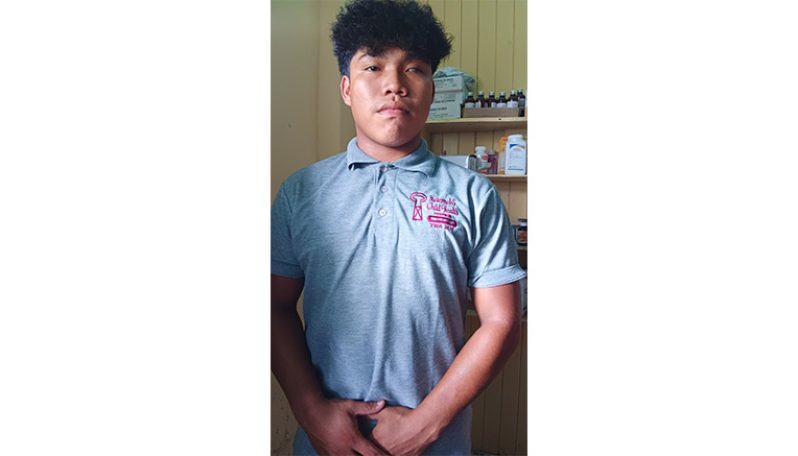Community Health Worker tells his story
COMMUNITY Health Worker (CHW), Warren Harris, has consistently demonstrated a deep yearning to learn and improve himself in the medical field over time, and his willingness to assist others is truly noticeable. Harris is attached to the Morashee Health Post, located on the Essequibo River in Region Three (Essequibo Islands-West Demerara), which is situated on the mainland.
This young man has been doing the most behind the scenes to help others seeking medical attention. Harris would volunteer with his colleagues to visit riverine villages to participate in health clinics and health day activities to bring much-needed medical services and expertise to locals. He is a resident of Lower Bonasika, a remote riverine village called River’s View in the Essequibo River.
The 20-year-old is a resilient individual living with disabilities. He is blind in one eye following an accident and also has a physical defect in one of his legs. Yet, these challenges have never stopped him from living a full and active life.
Harris never uses his condition as an excuse and, on any given day, can be found enjoying a game of cricket or football with his peers, just like anyone else. Harris is a very helpful and willing person who is always smiling and ready to assist in any way possible. His mannerism is also observed to be calm under pressure, and he is up for anything—literally.
It was two weeks ago, after he qualified as a Community Health Worker (CHW) trained by the Ministry of Health staff, that he began working at Morashee Health Post. As a villager of a remote community, Harris said moving around is by boat, and it is expensive to do so. Getting to classes was no easy feat, but he persevered anyway because he wanted to make a meaningful impact.
After being encouraged to take up the role, he gave it his all and was successful, even though he had to leave his village and venture out.
Harris told Pepperpot Magazine that, where he is from, opportunities for work are not plentiful since their main economic activities revolve around farming and fishing.
“The course wasn’t easy. I had to apply myself because I wanted to work and upgrade my life, so I was doing it for me and the community,” he said.
Harris added that he was previously unemployed. After he completed secondary school, there was nothing to do. He wasn’t into farming, nor did he want to leave the village and go to the hinterland for work in mining.
He weighed his options and decided that becoming a CHW was ideal for him. He likes to help others, and that role is almost perfect for him. Learning new things daily is also a plus in the job.
Harris views his job as giving back to the community that is still striving for full self-sufficiency and being in a remote village has its disadvantages. He related that he has been trying to guide his friends in the village to make something of their lives, too, but there is only so much he can say and do. It is now up to them to take his lead.
For Harris, it’s a good feeling to be able to earn money, as it marks the start of better things to come for him, and he has his sights set on becoming a doctor. First, he will give himself some time to gain experience on the job before he embarks on his career journey.
Harris explained that the hardest part for him was getting started, and now that he has, it will be easier for him to achieve his goals despite the challenges of being a resident of a far-fetched riverine village.
He is even prepared to travel to the city for the Medex course, and he remains optimistic he can do it and will apply himself to make it happen.



.jpg)








